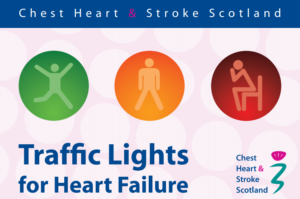Although a physical assessment will be undertaken at each visit (see assessment sheet), it’s important for the nurse to consider Molly’s emotions as well as her physical symptoms. Looking at Molly’s diary, although her symptoms are beginning to improve (legs are less swollen today) her mood is low as she is cancelling day trips out and talking about her friends dying and wondering when it will be her.
Below is an example of a specialist HF nurse assessment using a structured approach. HF services across Scotland may use a slightly different tool, but the information is the same.
File: Molly’s completed assessment sheet [PDF, 46KB]
- Blood Pressure
It is important to assess Erect (standing) & Supine (lying) blood pressure to detect any variation in appropriate patients, this may require additional questions regarding dizziness or lightheaded symptoms. You will sometimes see this written as E&S BP within medical or nursing notes. - Pulse
Manual pulse is important to determine rhythm and rate. - Weight
The patient should be encouraged to weigh themselves daily if appropriate and to note it in their diary or in a notebook. - Oedema
This is an important assessment observation and should be assessed at each visit and level of oedema noted. Asking patients if their shoes are tight can be useful to assess oedema verbally as some patients find it hard to be specific in terms of the level on their own legs. - Auscultation
Auscultation will be required to assess respiratory sounds and any fluid accumulation. - Heart Sounds
It is important to note heart sounds and any changes. - Oxygen Saturations
Saturations can be important and specifically useful if the patient has a respiratory co-morbidity. - Ascites
Some patients develop oedema in the abdomen area, this is called ascites. Checking if patients have needed to undo their belt or open trousers due to fluid retention are good ways of assessing verbally. - Ask the patient if they have any complaints?
All of these should be assessed verbally and documented.
Asking the patient how many pillows they currently use at night and if they have had any changes in their sleeping patterns is a practical, easily understood question. Patients may have begun to compensate for feeling breathless at night by increasing the amount of pillows they use to “prop up”. Often this has not been recognised as a worsening HF sign. - Any changes or comments
Additional information about mood and general feelings are important to note. - Bloods results
Bloods are required to be assessed regularly due to renal dysfunction or frequent changes to medication regimen, which may affect renal results. These should always be taken into account and in context of the individual patient. - Follow up
Follow up should be arranged and discussed with the patient at every visit.
A copy of the completed form should be faxed/sent to the appropriate MDT members – this may vary from area to area.
Pulse point
 Once Molly is on optimal medications further assessment may be considered if appropriate for her and with her at the centre of any decisions.
Once Molly is on optimal medications further assessment may be considered if appropriate for her and with her at the centre of any decisions.
It is useful to consider other materials and tools to support the HF nurse assessment such as CHSS: Living with Heart Failure [PDF]
Page last reviewed: 28 Jul 2020


